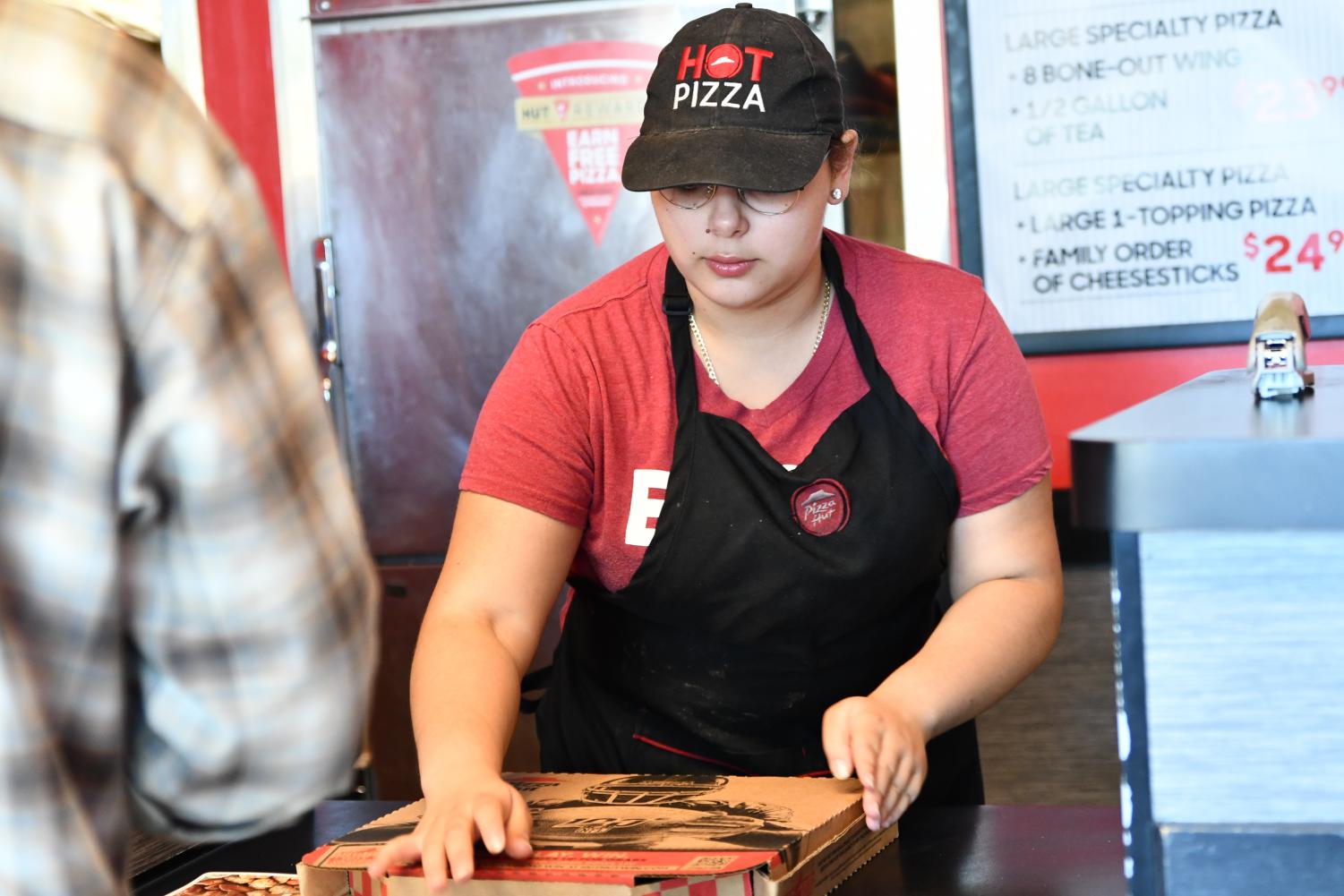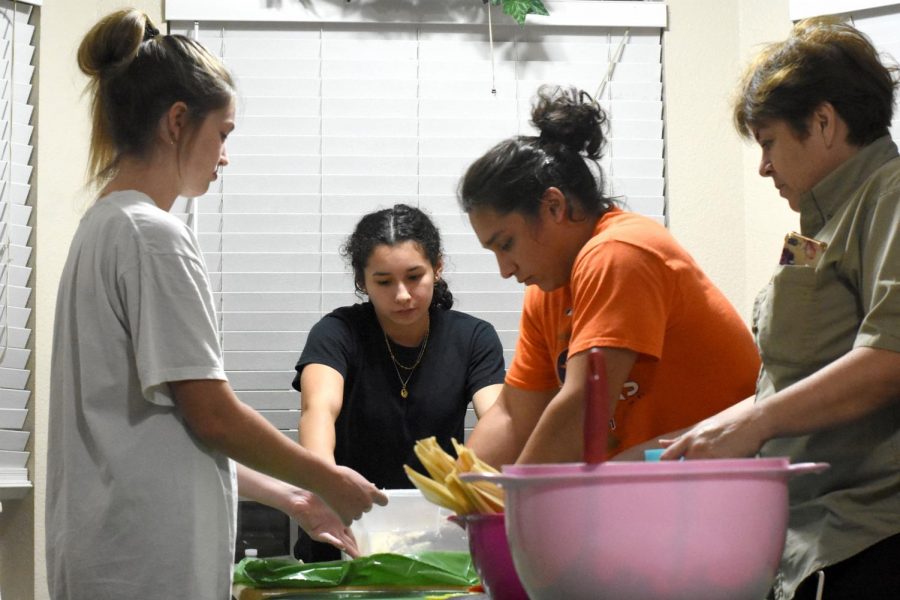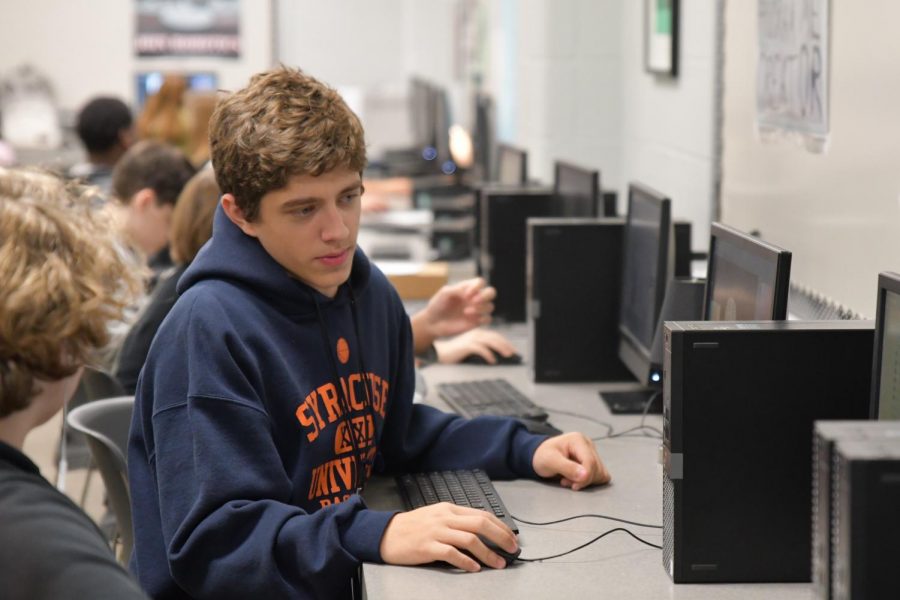Your donation will support the student journalists of Kingwood Park High School. Your contribution will allow us to purchase equipment and cover our annual website hosting costs. The journalism program at Kingwood Park is funded solely from student sold advertisements and community support.
Juggling it all
Students struggle as they balance jobs, classes, family duties and extra curricular activities.
November 5, 2019
Working teens struggle to find balance
Since freshman year, senior Lilli Woerner has worked as a soccer referee, a party director at Kids In Action, a waitress at Cypress Woods Retirement Home and as a sales clerk at PacSun and Hollister.
“It stresses me out, like a lot,” Woerner said, “just because thinking about finding time to fit everything in.”
Woerner is also a member of Student Council, every honors society Kingwood Park offers except one, and is taking four AP/Dual Credit classes.
Woerner is one of many students who take jobs to support themselves, help their families and improve their resumes. Their school weeks are long, and it just continues through the weekend. They go from classes to work and then finally home, where they have no choice but to work on school work late if they want to keep up with their classwork.
Senior Jasmine Gaytan is used to the questions and eye rolls from teachers when she mentions her job. She works 30-40 hours a week as a manager at Pizza Hut.
“They’re like, ‘Oh, you shouldn’t be working; you’re in high school. You don’t need a job,’” Gaytan said. “But I do need a job, I pay my own phone bill and I do like to spend my own money on things.”
Gaytan wants to pursue a career in the medical field, but her job leaves her little time to be involved in the school’s Health Occupations Students of America or anything else.
“I’m good at time management. However, I do put a little bit more on my plate,” Gaytan said. “So, I don’t ever get to do anything for as long as I like or do anything when it needs to be done.”
For others, the workload helps them with their school work. Senior Marcus Block falls into that category. He works at la Madeleine 18 hours a week and is involved in choir, criminal justice club and graphic design at school.
“Time management skills is what I’ve learned most from juggling a job and school,” Block said. “Ever since getting a job, I feel like my grades have improved because it helps organize my priorities.”
Junior Nicholas Zolton uses his job to help with his future career aspirations. At Code Ninjas he gets job experience to help him pursue a computer science major in college.
“I really enjoy my job, because I love teaching and I love the kids,” Zolton said. “It’s just fun for me. But it’s a huge time commitment even if I am getting paid for it. So especially on some nights before tests and stuff when I have a lot of studying to do, I don’t go to bed until 12 or 1 a.m.”
He misses hanging out with his friends He also has been working on becoming an Eagle Scout for longer than he had anticipated.
“A lot of adults are like ‘Ah, well, you know, we have jobs too and we have to pay bills,’” Zolton said. “And I get that, but we go to school eight hours, then I get home and go to work for four more hours and then I start on my homework, so it’s almost like working a 14-hour job every day.”
Senior Hannah Shippey works at Lesley’s Pool Supplies. With five siblings, she doesn’t enjoy spending so much time away from home.
“Just not having me around the house is tough for them because we do have so many people,” Shippey said. “We need stuff to get done and since I’m the oldest one there who’s not in college I hold a lot of responsibility in the family.”
Between being at the cash register, carrying heavy buckets and working with water chemicals, Shippey’s job isn’t simple. When she gets home at night she’s exhausted. With graduation coming up, there’s always still more work for her to do.
“It’s extremely draining,” Shippey said. “I’m either working on school, working at school or I’m working at work. I don’t get much time off.”
Shippey works to support her large family. She hates when she has no choice but to come to school after getting only four hours of sleep. She knows she can’t sleep her way through a school day. It’s difficult when she carries the stresses of her job on to the next day.
“We may be working 12 hours and then we go home and do three to four hours of homework,” Shippey said. “They’re always stressing, ‘You need sleep, you need sleep, you need sleep,’ but some of us don’t have that time.”
Family always remains top priority for Rivera regardless of busy schedule
Juniors Crosslin Silcott, Anaih Ibarra and Richard Rivera help prepare the masa for a new batch of tamales on Sept. 21 while Richard’s mom Jaqueline Rivera assists. “It was 15 of us in the kitchen,” Richard said of the weekend the journalism students made 900 tamales at his house. “We don’t really see each other that much because we’re in different classrooms, but I felt like I got to know them a lot more because we’re all talking to each other while we were doing it and just talking about everything and listening to our music.”
With music blasting and high schoolers laughing, junior Richard Rivera’s house was a rare scene on Sept. 20. Throughout Elm Grove, families were recovering from Tropical Depression Imelda. But at Rivera’s house, members of the journalism program were making tamales.
Richard grew up eating tamales in Mexico for Christmas and Thanksgiving. It was a family thing. Now, after making 900 tamales with his journalism classmates to help pay for journalism conferences, they’re a part of a new family.
“I felt like I got to know them a lot more because we’re all talking to each other while we were doing it and just talking about everything and listening to our music,” Richard said. “I enjoyed that a lot because I like to think of my friends as family. So having everybody at the house I was like ‘It’s a big family environment.’”
Richard, who is on the yearbook staff, runs track and works 25 hours a week at Whataburger. He makes sure his family is his top priority. He looks out for his older sister Lesley, who is currently a sophomore at Texas State, and his younger brother Randy.
Instead of letting Lesley get in trouble for forgetting to do a chore when they were younger, Richard would tell his mom that he would clean for her. He never wanted his sister to be in trouble.
“He puts his older sister and little brother before anything else,” his mom Jaqueline Rivera said. ”They mean the world to him.”
Richard’s relationship with his mom and grandmother is what fueled his love for tamales. When Richard went home from school one day talking about a band fundraiser, his grandmother came up with an idea to sell tamales rather than participate in the regular fundraiser. He had no idea what type of reaction he would get.
“The first time it was definitely like, ‘What if they don’t even like them?’ and then I would be that guy who couldn’t make the food right and it didn’t taste good,” Richard said. “That was my biggest worry about it.”
However, his tamales did not garner bad attention. At one point when was handing some out in class, somebody reported him to security for having a “suspicious package.” When called into former assistant principal Mark Ruffin’s office, he was told that he wasn’t allowed to sell tamales.
Then Ruffin asked him to bring some down if he had some extra tamales. Ruffin was thrilled to have some tamales of his own the next day.
“At the end, he wasn’t even mad,” Richard said. “He was more happy that he actually got something.”
Richard has been working for a long time. As a third grader he spent his summer fixing up a house his family was moving out of. He also helped fix cars. Now, he works at Whataburger.
“Working is always something that I’ve been doing since a little kid, and I guess you could say that’d be a part of Hispanic culture, but like you start maturing at a very young age because of what they need you to do and I just got so used to that,” Richard said. “It’s just ingrained in my head. I feel weird whenever I don’t work for some time because it’s something I’m used to.”
Richard works 25 hours at Whataburger. Then in his free time he helps build a jacuzzi for his backyard.
“He takes his job seriously,” Richard’s manager Esthepany Samantha Torres said. “It might just be fast food, but he does care genuinely and you can see it. He helps the team in any way he can at all times.”
He’s good at what he does and brings fun to the fast food restaurant. Through his hard work and good attitude, his family at home and at Whataburger envision him doing good things in the future.
“I see him working and helping people with the career he wants to go into,” Jaqueline said. “He would be good for what he wants to do. I see him as a successful kid. He has great levels of leadership that I see him using wherever he goes.”
Students narrow down activities when stretched too thin
Senior Brett Fahrenholz focuses on a graphic design project in Tonya Smith’s class in October. Fahrenholz quit football to be able to focus more on wrestling.
Time management is an issue for high schoolers. Students who work and are involved in sports and activities struggle to get their school work done or find time for themselves.
“One thing I struggle with is sleep,” senior Brett Fahrenholz said. “I think that if I got more sleep then I would be more healthy and ready to go in the morning.”
Fahrenholz has been playing football since he was 8 years old, but finding time in his schedule was becoming a struggle in high school. In his senior season, he gave up football to focus on wrestling.
“Every game I wish I was on the sidelines to give the guys a minute of rest,” he said. “But afterwards I remind myself that I made the right decision. Leaving football didn’t benefit just me. Missing football helped me be able to help the younger guys in wrestling.”
Junior Lauren Park, tries to find time in her day for school, tennis, church and her job at Alspaugh’s Hardware. With all of Parks’ activities she has to give up work to do everything else she enjoys.
“I manage it all by finding gaps in the days between working in school and doing most of my work then,” Park said. “I have to give up work because I play tennis and I am a part of many school and church activities.”
For Parks, trying to choose what to eliminate has been a challenge, especially because she said her parents have encouraged her to keep working.
“They push me to have a job, but parents don’t understand that it takes up most of my time,” she said. “Especially with junior year, I have so much to do but so little time.”
Along with Fahrenholz, sophomore Dylan Lee had to give up football to focus more of his time on debate and his criminal investigation club.
“I want to be a lawyer when I grow up and football wouldn’t get me there compared to how debate would,” Lee said.
Though Lee gave up football, he misses it.
“It makes me jealous when I see them playing and it’s kind of weird not going out, but I still hang out with the players and I am still included in the football group chat,” he said.
For those trying to balance so many different activities, prioritizing the most important ones are key. Even if they quit participating in one, it doesn’t usually lead to much free time. And it doesn’t fix all their issues. No matter how many clubs they are involved in, procrastination proves to be arguably the biggest issue many of the teens struggle to conquer.
“I am a procrastinator and it doesn’t help that homework is boring,” Fahrenholz said. “I do eventually do my homework so I don’t get C’s or D’s, but I do think my time management is a problem.”
Trying to balance so much and prioritizing is something Fahrenholz said has taught him lessons.
“Something I’ve learned over the past four years is to fight through it,” he said. “There were many days (at work) I was supposed to have off, but I got called in and I groaned. I never said no, though. High school has taught me that it sometimes pays off and to just deal with the struggles in the moment.”


